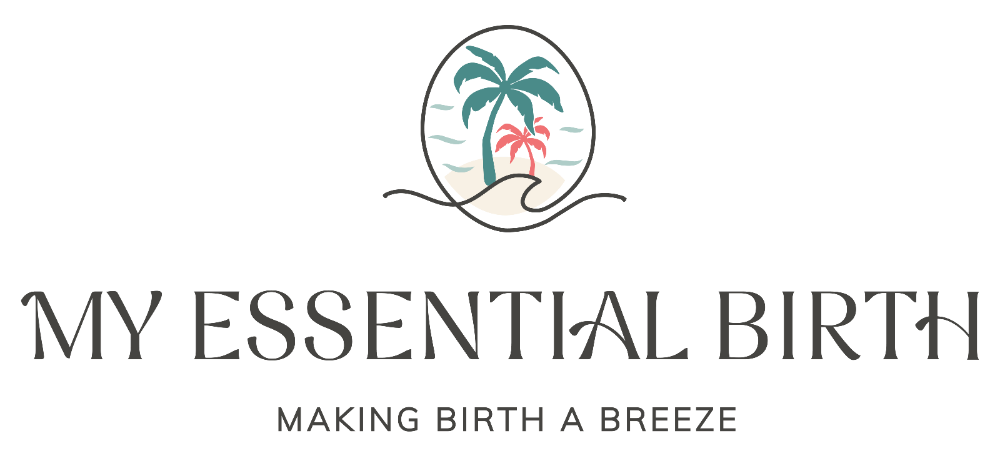
Our Best Advice on Navigating and Setting Boundaries with Loved Ones & How to Handle Postpartum Expectations
Show Notes:
[1:19] Our Reviewer of the Week, c-gerber, said "I found your podcast half way through my first pregnancy, and ended up buying your course soon after I listened to many of the birthing stories. I ended up having my first born daughter after only 7 hours of labour with no pain medication! It was an intense but amazing experience that I was able to have control of the whole situation. This course helped me take control of my first birth and allowed me to go into my labour confidently. My doctor was blown away at how fast I had my first child and my nurse was also amazed! I told them about this course I took and my nurse wanted to know what it was called so she could tell other woman about it after witnessing my birth!!!"
[2:25] This week, we're switching it up a bit and talking about postpartum boundaries. Postpartum is really a time for mom to be healing, for that bonding to happen between mom, baby, and birth partner. It's kind of this like sacred space and time, whether this is your first or your fifth baby that you get to enjoy together as a family. There are some things that make it go well, and there are some things that can make it go less well.
[3:21] The truth is that once we have a baby and we have people over, if we don't have these things in place, it's really easy to just have somebody kind of come in and not even intentionally or on purpose really overreach in some areas that make us feel uncomfortable and unsettled.
[3:49] We have a whole visualization exercise that we do for labor and birth. I want you to do the same thing with postpartum. I want you to be thinking about: Who is in the room? What does it feel like? What are the lights like? Where are things located? Who's helping you? What are you and baby doing? Is somebody holding baby so that you can eat? Are you holding baby and somebody's doing laundry or cooking for you? What does that look like? What does your perfect postpartum look like? Is it quiet? Is it loud? Are people touching your baby? Are they not? Are they bringing you gifts? You know, what does that look like for you? That'll help you get an idea of boundaries.
You can plan for all of these things and think you're going to be fine with this amount of visitors or this person visiting or people touching your baby or not touching your baby. Then postpartum is there and people are in your space, and you are not comfortable with it anymore.
[6:57] Reminder: For you first time moms, just know it's okay to not have all the answers, and it's okay to feel what you are feeling. You will step into that role of motherhood exactly as you were supposed to. Have faith and a little bit of confidence because it's going to be great.
[7:17] When you have a baby, everybody gets so excited, they want to come over, and they want to see the baby. People are going to show up, right? Unless you say "don't show up during this time and this time" or you add some boundaries, it can be really overwhelming, which sounds maybe a little bit silly. When people show up, maybe that doesn't feel like it's normally overwhelming, but as you're learning to read your baby's cues and you're working on that bonding, when somebody else is in your space, it just feels a little bit overwhelming. It's something that you're going to need to discuss with your birth partner. Just like they needed to know your birth plan for pregnancy, they need to know your postpartum plan for when people are coming into the home, and you really want to make sure that they are on your side and supportive of you, especially because it's likely going to involve his family too.
[9:58] If you are pregnant right now, I want you to start thinking about what those early postpartum days are going to be like. What are your priorities? If you are giving birth in a hospital setting, are you wanting people to come visit you at the hospital? Are you wanting that time to be just you and your birth partner and baby alone? The best part about the hospital is if you do not want people in that space, you just ask the nurses to cover for you and they are so good about it.
[12:07] Postpartum is just a really special time, and it deserves whatever kind of sacred space you feel is best for you and your family. Trust me, you will not regret doing what you feel is best for you and your family. If you are someone who shies away from confrontation, which is really common, set those boundaries ahead of time. Consider having your birth partner handle those conversations for you, if possible.
[12:46] In regards to postpartum visitors, one thing we recommend is having a delegation list. Whatever you're willing to let go of and delegate, put it on the list. That can include cooking meals or whatever else. You don't have to cook all of your own meals, and you're still getting exactly what you need.
[15:03] If you don't want anybody else to hold your baby, just say, "I'm so sorry. You can look at them, but in this early stage, we're just really trying to be healthy. We love you so much, but for my well-being, I'm not comfortable right now. It's making me a little bit anxious to have other people hold them." You do not have to hand your baby to anybody. If you are worried at all that somebody is going to test those boundaries, just don't even bother. It's not worth it.
[17:29] The best thing that you can do is at least to try to be on the same page and discuss expectations with each other, but understand that it will change as time goes on. I think it's easy for dads to feel like, "I don't know what to do." Sometimes it's nice to just feel like you're not in it alone.
[20:52] You can also bring in the extra help, and that can even come in the way of a postpartum doula. This is somebody who can come at any time day or night. It is someone that you would interview just like a pregnancy labor doula. They are specialized in newborns and newborn responses, moms and mothering, and whatever else you need. They can watch the baby while you sleep. They can fold towels and cook and, whatever you need them to do so that you're able to focus on your family.
[23:40] We have this big drop in some of these postpartum hormones, and mom can experience baby blues. After those couple of weeks, we're looking at some different issues. Make sure mom is eating healthy? Is she still getting high protein? Is she drinking enough water? Is she walking and getting outside every day, especially in the sun? Is she doing those things to care for herself? How was her sleep? How's her healing going?
[25:57] This is a beautiful, wonderful, life-changing thing that happens every time we bring a baby into the world. It changes us in all kinds of ways for good and for bad. You're working through that together, right? Every challenge you overcome together, you're going to be that much stronger from it and grateful for it. When you're going through it, it can be tricky. You want to make sure that you have the right support from each other and for each other. It's 100% okay to communicate your desires and to have a plan for that postpartum period because if you don't, or if you're lenient on some of these things, it can actually lead to a harder postpartum time and even some regrets.
To Leave a Review ⭐️
- Open Apple Podcasts
- Find “Pregnancy & Birth Made Easy” podcast
- Select “Ratings and Reviews”
- Click the stars!
- Select “Write a Review” and tell us what was the most amazing, comforting, eye-opening thing that you loved!
ALL the best,

Links Mentioned:



